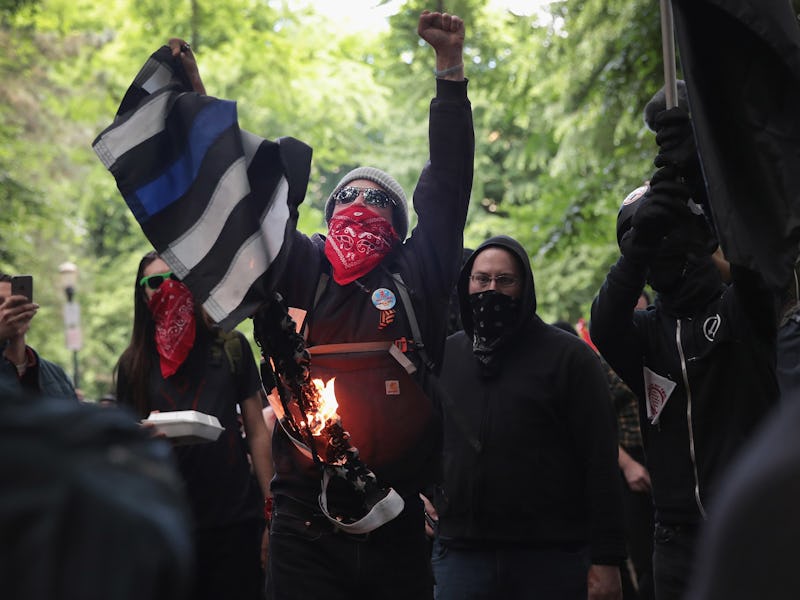Masked Protesters Can't Hide From this New Facial Recognition AI
Not even masks and scarves can protect you from Big Brother.

The recent clashes between white supremacists and counter-protesters in Charlottesville and elsewhere have shone a spotlight on masked anarchist groups like Antifa
. While debates rage over the group’s tactics and how they fit into the broader fight against the far right, one thing is certain: For as long as Antifa is around, anonymity will be a big part of protesting.
But new research reveals facial recognition A.I. may soon be able to virtually unmask protesters, even when they disguise their faces with hats, scarves, and sunglasses.
“This is very interesting for law enforcement and other organizations that want to capture criminals,” Amarjot Singh, a researcher at the University of Cambridge and one of the authors of the paper, tells Inverse. “The potential applications are beyond imagination.”
Singh says the idea for this work came out of facial recognition shortcomings observed in high-profile crimes like the Boston bombings.
“We’re close to implementing it practically,” Singh says of the facial recognition system he and his colleagues have developed, though he acknowledges they need to introduce the AI to a lot more data before they can know for sure it’s ready to be used to identify real people wearing real masks.
Some of the masked protesters who defended Charlottesville.
The paper, which Singh and his colleagues will present at October’s IEEE International Conference on Computer Vision Workshops. The researchers created a “disguised face identification” framework, training it on a small dataset of 2,000 images of 25 different people in various states of disguise against different backgrounds. By looking at 14 facial key-points, the AI correctly identified people wearing hats and scarves 69 percent of the time. It’s able to do so by connecting the key-points and angles that are visible to approximate the rest of the facial structure.
Zeynep Tufekci, a techno-sociologist and academic, took to Twitter Monday to call attention to the dangers such machine learning poses for Antifa, or any protesters who don’t want authorities or those in power to learn their identities.
Already, 4chan “vigilantes” looking to dox demonstrators have emulated this approach with more rudimentary technology, like superimposing images using PhotoShop. As Tufekci points out, machine learning wouldn’t be a foolproof way for cops to identify masked protesters, but it could be more than accurate enough to justify it widespread use.
Singh, who has seen criticisms like Tufekci’s online, acknowledges that this concern is valid.
“This has to be regulated, I guess, to make sure that it doesn’t actually fall into the hands of the people who want to use it for wrong,” he said.
There is a long way to go before this kind of framework can actually be implemented at scale. But Tufekci, who notes that this specific paper is “not great,” also warned that the underlying threat at hand is real, and likely only to get more serious as governments and law enforcement agencies realize the true potential of this AI.